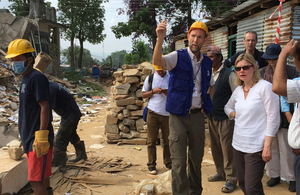UK boosts support to Nepal’s reconstruction and recovery effort
The new funding will provide immediate relief to hard-to-reach communities and focus on rebuilding vital infrastructure.

Justine Greening sees earthquake damage in Nepal. Picture: Zoe Paxton/DFID
The British response to the recent devastating earthquakes now stands at £70 million, following further commitments made at the International Conference on Nepal’s Reconstruction today (25 June 2015).
The UK remains committed to the long-term reconstruction of Nepal and is taking a leading role in the response to meet the Nepalese people’s emergency needs and to boost the country’s recovery effort.
As well as continuing to provide immediate relief to hard to reach communities, this new support will focus on rebuilding vital infrastructure, including hospitals and supporting women and vulnerable groups to rebuild their lives and livelihoods.
UK International Development Secretary Justine Greening said:
Thousands of people remain homeless or cut-off in mountainous areas following the recent earthquakes in Nepal. Hospitals and schools have been destroyed, and people’s livelihoods torn apart. Now the monsoon season threatens to make the situation even worse.
When I visited Nepal recently, I was struck by the determination of the Nepalese people I met to get their lives back on track and Britain will continue to help them do this. That means redoubling our efforts to help Nepal and its people rebuild hospitals, reclaim livelihoods and protect the most vulnerable, including women and girls.
Britain’s pre-positioned shelter kits meant that within a few hours of the earthquake, British aid was reaching hard-hit communities and providing temporary homes to thousands of people across Nepal. We will continue to fund this work to ensure people are prepared for future disasters.
The UK will continue to work with the government of Nepal to help the country recover from this devastating crisis. Ahead of the monsoon season, the government needs to prioritise humanitarian support and ensure relief supplies are quickly deployed so we can reach the most vulnerable in the most remote areas.
Background
The UK is one of Nepal’s largest bilateral development partners. Over the last 2 years DFID has provided more than £170 million of development assistance to help reduce poverty and promote economic development in Nepal.
Of the £70 million, £33 million is already helping Nepal in the wake of the earthquake. This includes:
- £10 million to rebuild vital health services in the worst affected districts
- £5.3 million for UN agencies in Nepal to coordinate the international relief effort and provide clean water and shelter for affected families
- £3 million released under the Rapid Response Facility (RRF) to 6 charities and non-governmental organisations (NGOs) already working on the ground: Save the Children, Mercy Corps Scotland, Care International UK, ActionAid, Oxfam and Handicap International
- £2 million for the British Red Cross
- £5 million to match public donations to the Disasters Emergency Committee’s appeal, which will support NGOs on the ground
- a £5 million package to provide a further team of 30 trauma medics, logistical support and equipment to ease congestion at Kathmandu Airport and humanitarian experts in water, health and sanitation. DFID also deployed a team of more than 60 UK International Search and Rescue (UKISAR) responders and specialist rescue dogs
- £2.5 million for the UN Humanitarian Air Service to enable organisations already on the ground to deliver aid to isolated areas and
- more than £300,000 for Mission Aviation Fellowship (MAF) to provide 2 Airbus 350 helicopters to get help to more remote regions.